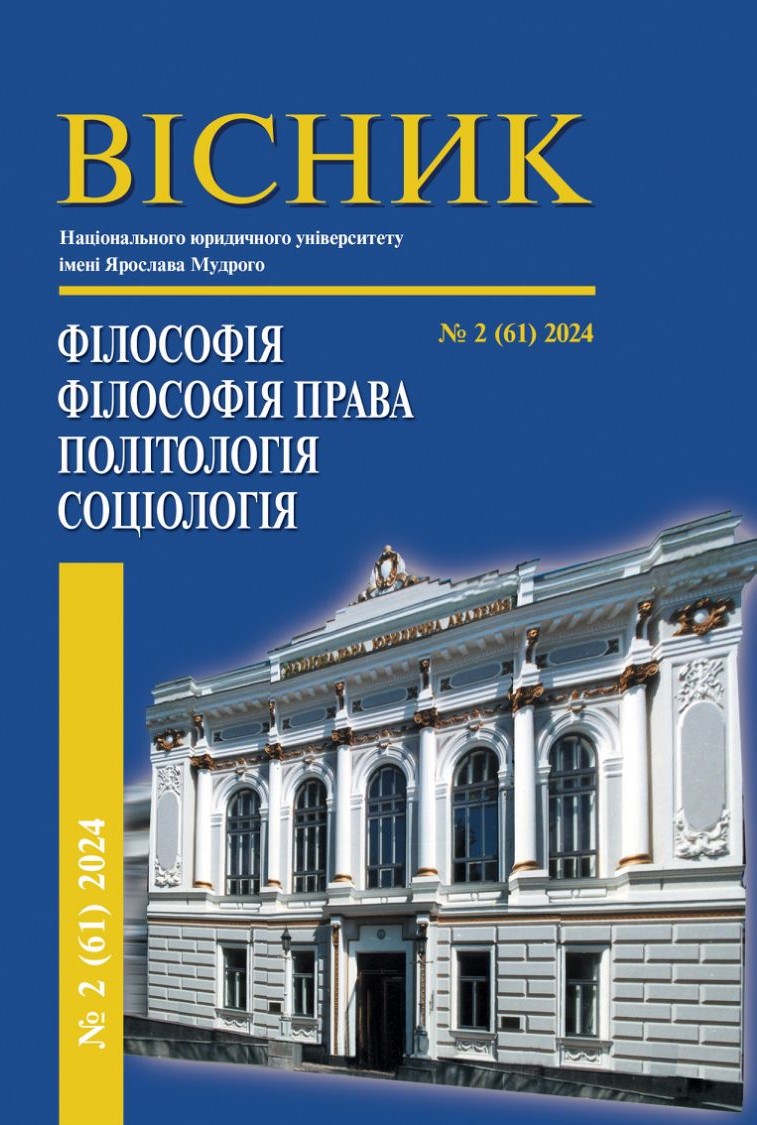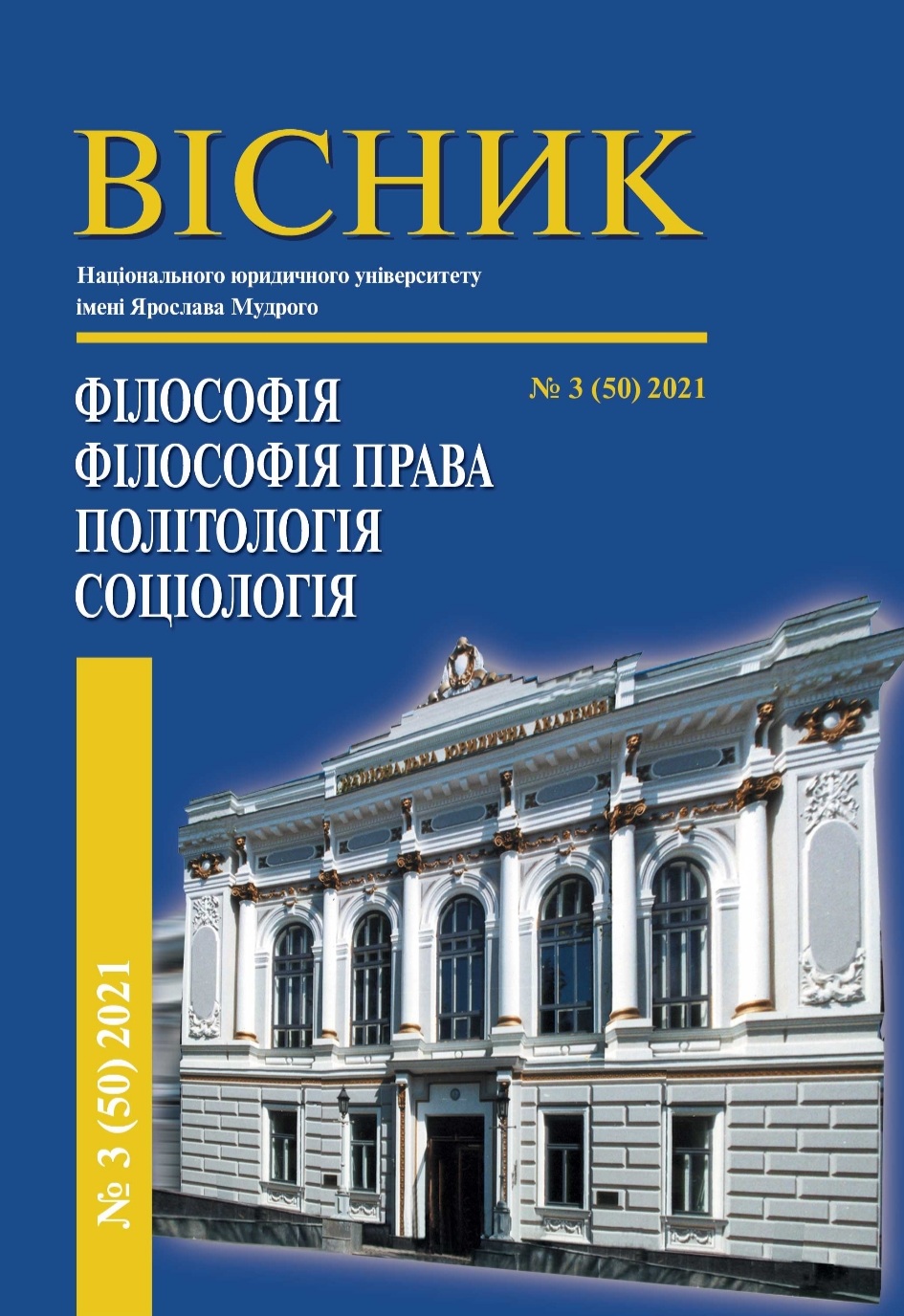ЦИФРОВИЙ НОМАДИЗМ ЯК НОВИЙ МОДУС ІДЕНТИЧНОСТІ: ДОСВІД ФІЛОСОФСЬКОГО ОСМИСЛЕННЯ
DOI:
https://doi.org/10.21564/2663-5704.61.304563Ключові слова:
цифровий номадизм, мережеве суспільство, ризома, ідентичність, цифровий простірАнотація
Стаття є спробою філософської рефлексії цифрового кочівництва як соціокультурного явища. Умови формування та специфіка цифрової ідентичності описані з урахуванням ризоморфного характеру мережевого суспільства. Представлені лінії реалізації ідентичності, що відбивають світоглядні настанови нео-номадів, підкреслюють процесуальний і технологічно залежний характер їхнього буття. Простір існування електронного кочівництва показаний як антиномічний, що в умовах оточеності цифровими потоками суперечливо впливає на метафізику цифрового номада та репрезентацію його ідентичності.
Посилання
Bauman, Z. (2011). 44 Letters from the Liquid Modern World. Cambridge: Polity Press.
Deleuze, G., Guattari, F. (1987). A Thousand Plateaus: Capitalism and Schizophrenia. London: University of Minnesota Press Minneapolis. URL: https://files.libcom.org/files/A%20Thousand%20Plateaus.pdf.
McLuhan, M. (1964). Understanding Media: The Extensions of Man. New York: McGraw Hill.
Deleuze, G., Guattari, F. (1986). Nomadology: The War Machine. New York: Semiotext(е).
Bauman, Z. (1993). Postmodern Ethics. London: Routledge.
Braidotti, R. (1994). Nomadic subjects: Embodiment and sexual difference in contemporary feminist theory. New York: Columbia University Press.
Attali, J. (1991). Millennium: winners and losers in the coming world order. New York: Random House.
Makimoto, T., Manners, D. (1997). Digital Nomad. New York: Wiley New York.
Braidotti, R. (2011). Nomadic Theory. The portable Rosi Braidotti. New York: Columbia University Press.
Macgilchrist, F., Allert, H., Bruch, A. (2020). Students and society in the 2020s. Three future «histories» of education and technology. Learning, Media and Technology, 45 (1), 76–89. doi: https://doi.org/10.1080/17439884.2019.1656235.
Demaj, E., Hasimja, A., Rahimi, A. (2021). Digital nomadism as a new flexible working approach: Making Tirana the next European hotspot for digital nomads. The flexible workplace (M. Orel, O. Dvouletý, V. Ratten Eds.). New York: Springer International Publishing, 231–257.
Hensellek, S., Puchala, N. (2021). The emergence of the digital nomad: A review and analysis of the opportunities and risks of digital nomadism. The flexible workplace (M. Orel, O. Dvouletý, V. Ratten Eds.). New York: Springer International Publishing, 195–214.
Orel, M. (2023) Wanderlust workforce: a journey into understanding digital nomadism, World Leisure Journal, Vol. 65, 2, 143–149. doi: 10.1080/16078055.2023.2210017.
Hannonen, O. (2020). In search of a digital nomad: Defining the phenomenon. Information Technology & Tourism, Vol. 22, 3, 335–353. doi: https://doi.org/10.1007/s40558-020-00177-z.
Nash, C., Jarrahi, M., Sutherland, W. (2021). Nomadic work and location independence: The role of space in shaping the work of digital nomads. Human Behavior and Emerging Technologies, Vol. 3, 2, 271–282. doi: https://doi.org/10.1002/hbe2.234.
Castells, M. (2000) The Network Society: The Information Age: Economy, Society and Culture. Oxford: Blackwell.
Bard, A., Söderqvist, J. (2002). Netocracy: The New Power Elite and Life After Capitalism. New Jersey: Pearson FT Press.
Bauman, Z. (2000). Liquid Modernity. Cambridge: Polity Press. URL: https://epdf.tips/liquid-modernity.html.
Urry, J. (2016). Mobilities: New Perspectives on Transport and Society. Oxford: Routledge.
Foucault, M. (1995). Discipline and Punish: The Birth of the Prison. New York: Vintage Books.
Baudrillard, J. (1994). Simulacra and Simulation. Michigan: University of Michigan Press.
Danilyan O., Dzоban A., Kalinovsky Y. (2019). Man in informational society: from moral identification to moral identity. National Academy of Managerial Staff of Culture and Arts Herald, 1, 108–113.
Danilyan O.G., Dzeban A.P., Kalinovsky Y.Y., Zhdanenko S.B., Kalnytskyi E.A. (2019). Problems of adaptation of a man to the conditions of information society. Media, Culture and Public Relations, Vol. 10, 30–41.
Deleuze, G., Guattari, F. (2009). Anti-Oedipus: Capitalism and Schizophrenia. London: Penguin Classics.
Bey, H. (2003). T.A.Z.: The temporary autonomous zone, ontological anarchy, poetic terrorism. New York: Autonomedia.
Bauman, Z. (2007). Consuming Life. Cambridge: Polity Press.
Foucault, M. (1986). Of other spaces. Diacritics, Vol. 16, 1, 22–27.
Deleuze, G. (1990). The Logic of Sense. New York: Columbia University Press.
Getman, A.P., Danilyan, O.G., Dzeban, A.P., Kalynovskyi, Yu.Yu. (2022). Modern ontology: reflection on the continuity of cyberspace and virtual reality. Revista de Filosofía, Vol. 39,102, 78–94.
Castells, M. (2003). The Internet Galaxy: Reflections on the Internet, Business, and Society. Oxford: Oxford University Press.
Danilyan, O.G., Dzeban, A.P., Kalinovsky, Y.Y., Kalnytskyi, E.A., Zhdanenko, S.B. (2018). Personal information rights and freedoms within the modern society. Informatologia, Vol. 51 (1-2), 24–33.
Danilyan, O., Dzоban, O., Kalynovskyi, Y. (2023). Digital man as a product of the information society. Cogito, Vol.15, 1, 142–158.
Ahuja, S, Nikolova, N, Clegg, S. (2020). Identities, digital nomads, and liquid modernity. Oxford: Oxford University Press.
Ashford, S.J., Caza, B.B., Reid, E.M. (2018). From surviving to thriving in the gig economy: A research agenda for individuals in the new world of work. Research in Organizational Behavior, Vol. 38, 23–41.
Danilyan, O., Dzeban, O., Kalynovskyi, Y. (2022). Social instability as a global trend of the modern world. Cogito, Vol. XIV, 3, 141–161.
D’Mello, M., Sahay, S. (2007). “I am kind of a nomad where I have to go places and places”… Understanding mobility, place and identity in global software work from India. Information and Organization, Vol. 17, issue 3, 162–192.
Cousins, K., Robey, D. (2015). Managing work-life boundaries with mobile technologies: An interpretive study of mobile work practices. Information Technology and People, Vol. 28, issue 1, 34–71.
Kovalenko, I., Meliakova, Y., Kalnytskyi, E. (2023). Victim as a media construct in the space of biopolitics. The Bulletin of Yaroslav Mudryi National Law University. Series: Philosophy, philosophy of law, political science, sociology, Vol.4, 59, 49–69 [in Ukrainian].
Jarrahi, M.H., Sawyer, S., Erickson, I. (2022). Digital assemblages, information infrastructures, and mobile knowledge work. Journal of Information Technology, Vol. 37, issue 3, 230–249.
McLuhan, M. (1962). The Gutenberg Galaxy: The Making of Typographic Man. Toronto: University of Toronto Press.
Debord, G. (1967). La Société du Spectacle. Paris: Buchet-Chastel [in French].
Baudrillard, J. (2008). Fatal Strategies. Los Angeles: Semiotext(e).
Bruno, F., Rodríguez, P.M. (2022). The Dividual: Digital Practices and Biotechnologies. Theory, Culture & Society, Vol. 39, 3, 27–50.




